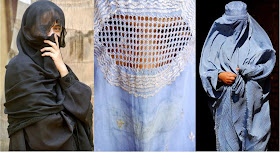The controversy of wearing a burqa, a head-to-toe covering worn exclusively by women, designed to conceal the entire body, including the face, has become a subject of contention worldwide. I was recently engaged in an electronic string of opinions on the subject, where anger, dismay, and alarm were revealed in each contributor’s electronic voice. The various opinions made me look deeper within and weigh how I feel, and to also research the current status, beliefs, and laws on wearing a burqa.
My initial knee-jerk reaction to the tweets that I read was that a woman in the United States has the right to wear whatever they choose. If a woman chooses to wear a hijab, the traditional covering of the hair and neck worn by Muslim women, or a burqa, a full body-covering, due to religious and cultural traditions, then let them do it. Upon further research and learning about both sides of the argument, my thoughts on the matter have changed.
The burqa is primarily worn by women in Pakistan, India and Afghanistan. Under the Taliban regime in Afghanistan, all women--including foreign visitors--were required to wear burqas. Today, it is no longer a necessity but still the preferred choice of many women, who wear the burqa as a safety measure given their country's volatile political regime.
Many people and entire countries say and believe that the burqa is not a religious driven act, and therefore it should be banned from use in public places. It is a moot point as to where or why the burqa is being used by some Muslim woman; the point is that it is and has been a tradition for centuries. While the burqa is often associated with the Islamic faith, its history actually predates Islam by thousands of years. The earliest known instance of women veiling their faces is found in the Assyrian empire, which dates back to 5000 BC.
The problem in the banning of the burqas is that it is infringing on the traditions and beliefs of Middle Eastern peoples centuries old values and mores. Many woman in the Middle East, still choose to wear the burqa when going out in public to protect themselves from being targets of political unjust doings.
We all know that banning and denigrating a cultural tradition simply divides communities and engenders anger and resentment in a way that is not constructive toward building a multicultural society. Yet, in the post 9/11 era, it is a difficult stance to allow people to be hidden by a full body-covering outside of the Middle Eastern countries where the custom is embraced. Security issues are elevated worldwide now, and many European countries are banning wearing burqas. Belgium was the first European country to ban wearing burqas. France recently banned the burqas and face-veils in public. Germany, Britain, and Spain are also following the lead of France in prohibiting burqas in public.
In the United States, the custom of woman wearing the burqa in public is protected by the first Amendment. Recent stories have surfaced where women have tried to get a driver’s license photo with their face covered by the burqa and were denied. Repercussions regarding these isolated incidents have caused law-suites on the basis of religious rights being restricted.
Unfortunately, it may be true that most woman wearing burqas are doing so due to tradition or religious belief, however, it allows for those that mean to do harm to have a perfect cover-up to hide their identify and more. For governments, to modify existing laws such as driver license policy stating that the full-face picture is the requirement, to allowing the face to be completely covered, doesn’t make sense nor is it logical in the present global reality. Banks also have had to rewrite policies so that a person can easily be identified while doing business in the establishment.
A society is built on the mores and values derived from the established practices of a society rather than its written laws. They consist of shared understandings about the kinds of behavior likely to evoke approval, disapproval, toleration or sanction, within particular contexts.
Each country has its own set of mores and values. When I traveled to Italy and visited St. Peter’s Basilica, in Rome, I witnessed a woman being turned-away from entering the church because she had a mini-skirt on that was more than 5” above the knee. A dress code is established for entering the church, and those that want to visit must adhere to the rules if they wish to enter. In the Middle East it would not be unacceptable to wear a bikini bathing suit in public.
In summary, we must honor and respect the cultural rules of the country that we are visiting or choosing to setup our permanent residence. In total respect of those that wish to continue wearing a burqa, realize that in the United States, there are laws and policies that everyone that lives here must abide by. Since it is, and has been the custom to show full-face photo for driver's license in the majority of states, then one must abide by the rule. Some states have accommodated the burqa wearing woman by taking the photo in private with another woman present. If this is not acceptable, then a driver's license should not be permitted.
Further reading on U.S. burqa policies by state:
http://moritzlaw.osu.edu/electionlaw/litigation/documents/LWVJ.pdf

No comments:
Post a Comment